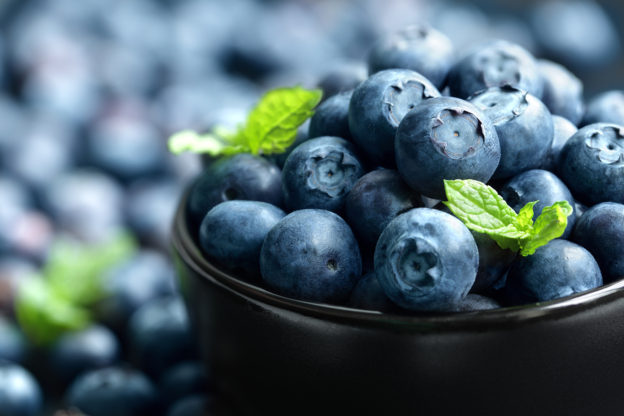By David Blyweiss, M.D., Advanced Natural Wellness
December 20, 2019
Want a treat? Here’s one of my favorite things to eat in the morning…
Take a whole cup of organic blueberries and combine it with plant-based yogurt. Then, mix in two tablespoons of chia seeds, a few drops of vanilla, and let it sit overnight.
The next day, you’ll have a delicious and healthy chia seed pudding. My mouth is watering right now just thinking about it.
One of the main reasons this meal is so good has to do with the blueberries. They fall into a category we call “superfoods.”
Superfoods contain a high amount of vitamins, minerals and nutrients that prevent almost every disease known to man.
Now, you might think these foods are expensive and hard to come by. That’s simply not true.
And they don’t have to be exotic discoveries from the Amazon rainforests or African jungles. In fact, you probably have plenty of superfoods right in your own kitchen.
So when folks ask me about these foods, they’re often surprised at how easy it is to add more of them to their daily meals.
Here are some of my favorite superfoods. They’re so common you can eat them every single day.
Two Super-Fruits for Super Health
Organic pomegranate should be at the top of your must-eat-daily list. That’s because these nutrient-dense fruits have about 20% more antioxidant power than açaí, cranberries, blueberries and green tea.
Open your arteries, improve blood flow for a new health miracle...
Did you know your circulatory system has over 60,000 miles of arteries, veins and other blood vessels, if stretched end to end?
But as you age, your blood vessels undergo changes, which may cause them to stiffen, thicken and get clogged.
GOOD NEWS! Doctors have now identified a “Miracle Molecule” inside your arteries that helps OPEN your arteries and IMPROVE blood flow.
It’s what Dr. Valentin Fuster calls it, "One of the most important discoveries in the history of cardiovascular medicine."To you, that means...
- Healthy blood pressure
- Sharper mind and memory
- Skyrocketing energy and muscular strength
- Increased pleasure and passion in the bedroom
- Improved circulation to every cell and organ in your body
Go here to discover a new natural way to significantly boost the levels of this miracle molecule in YOUR body NOW!
The list of health benefits is practically endless. Pomegranates reduce your chances of breast and colon cancer. They lower blood pressure, blood sugar and inflammation.
In addition, this delicious fruit helps boost levels nitric oxide in your body. Nitric oxide relaxes your arteries and decreases plaque build-up in them, as well as improving blood flow. It even boosts erectile function in men.
Now, I love pomegranates. But it can be a real pain to get the juice out of those little seeds. But if you’ve never tried pomegranate before, give it a try!
Pick one up the next time you’re at the market – just make sure it’s organic. You can also try a pure, all-natural pomegranate juice, but stay away from the popular brands full of sugar.
Organic blueberries are one of my favorite treats. I try to eat them every single day.
They’re good for your heart. They’re good for your brain. They’re good for your skin. They’re good for your blood sugar and insulin. They’re just great!
These little berries contain anthocyanins, which help reduce plaque in your arteries and lower blood pressure. They can even help slash your risk of heart attack by as much as 33%.
They also help boost brain signaling. This can keep your brain younger and smarter as you age. In fact, people who eat the most blueberries are able to keep their minds sharper for longer.
Blueberries also contain pterostilbene, an antioxidant similar to resveratrol. But it’s about four times easier for your body to absorb.
In animal models it lowers blood sugar and improves insulin response. And it appears to be much better than resveratrol when it comes to brain function and Alzheimer’s disease. It may also offer protection against cancer of the lungs, breast and pancreas.
Three More Foods that Fight Aging and Disease
Extra virgin olive oil is a staple in my kitchen. I use it on almost everything I cook… and even some foods that aren’t cooked. In fact, one of my favorite ways to enjoy olive oil is mixed with lemon juice as a salad dressing.
And, of course, extra virgin olive oil is a star player for the Mediterranean diet.
It’s loaded with natural antioxidants called polyphenols. These compounds can actually “turn off” bad genes which cause heart disease, obesity and type 2 diabetes. In effect, they shut down inflammation – which is at the root of most disease.
The World's Quickest Solution for Ending Prostate and Urinary Misery
This has recently been revealed to be one of the only real breakthroughs in prostate health.
The seeds of a strange fruit (sometimes called "Chinese Apples") hold powerful phytonutrients that are a revolution in prostate health.
In fact, UCLA and Veterans Administration research have now proved this to be true.
Not only that, but it may be the worlds quickest solution for ending prostate misery.
Simply stated, these phytonutrients represent a huge step beyond beta sitosterol, saw palmetto, and other phytosterols alone.
Simply click HERE if you want to have fast prostate relief...restful, uninterrupted sleep...no more constant "urges to go"...enhanced virility...and optimal prostate support for life.
When you add olive oil to a Mediterranean way of eating, it offsets all of the risk factors for stroke and heart attack. It also counters obesity and helps keep your mind sharp. So it makes good sense to add it to all of your meals.
Just be careful to find a high-quality olive oil and avoid heating over very high heat. I usually search online for the “best olive oil” from a current year and order it there rather than relying on grocery store varieties.
Cruciferous vegetables are an absolute must in any diet. They contain powerful phytonutrients called sulfuraphane and indoles that have anti-cancer properties.
These compounds work together to block cancer and protect cells from DNA damage. They also help kill off damaged cells and prevent the formation of tumors.
Eating this type of vegetable can cut your risk of many different kinds of cancer, including breast, prostate, colon and lung cancer.
Veggies that fall into this category include arugula, bok choy, broccoli, Brussel sprouts, cabbage, cauliflower, collard greens, kale, mustard greens, radishes, rutabaga, turnips and watercress.
Green tea is another winner in my book. Green tea works at the genetic level. In fact, it can reduce damage to your genes by about 20%. This is a big plus when it comes to stopping age-related diseases.
Plus, people who drink about three cups of green tea each day have longer telomeres than people who don’t. (Telomeres, which are the protective caps on ends of your chromosomes, are a marker of age.)
And they aren’t just a little bit longer… they’re a lot longer!
Green tea drinkers have telomeres that are about five years younger than people who don’t drink it.
Green tea is also linked with reduced risk of three different causes of death: Heart disease, stroke and respiratory disease.
Simply invest in a good matcha, longjing or other green tea of your choice and enjoy several cups (hot or cold) each day.
These foods aren’t the only superfoods available to you. There are plenty of other foods – like turmeric, avocados, garlic, tomatoes and nuts – that also provide a range of health and anti-aging benefits. Remember: If it came out of a factory it was probably made for taste and convenience, if it came out of the ground it was probably made for you.
SOURCES:
Rocha A, et al. Pomegranate juice and specific components inhibit cell and molecular processes critical for metastasis of breast cancer. Breast Cancer Res Treat. 2012 Dec;136(3):647-58.
Wang L, et al. Specific pomegranate juice components as potential inhibitors of prostate cancer metastasis. Transl Oncol. 2012 Oct;5(5):344-55.
Asgary S, et al. “Clinical Evaluation of Blood Pressure Lowering, Endothelial Function Improving, Hypolipidemic and Anti-Inflammatory Effects of Pomegranate Juice in Hypertensive Subjects.” Phytother Res. 2013 Mar 21.
Cassidy A, et al. High Anthocyanin Intake Is Associated With a Reduced Risk of Myocardial Infarction in Young and Middle-Aged Women. Circulation. 2013; 127: 188-196.
Devore EE, et al. Dietary intakes of berries and flavonoids in relation to cognitive decline. Ann Neurol. 2012 Jul;72(1):135-43
Antonio Camargo, et al. Gene expression changes in mononuclear cells from patients with metabolic syndrome after acute intake of phenol-rich virgin olive oil. BMC Genomics, 2010.
Ramón Estruch, et al. Primary Prevention of Cardiovascular Disease with a Mediterranean Diet. New England Journal of Medicine, 2013.
Nancy Babio, et al. Mediterranean diets and metabolic syndrome status in the PREDIMED randomized trial. CMAJ, October 2014.
Martinez-Lapiscina, et al. Mediterranean diet improves cognition: the PREDIMED-NAVARRA randomised trial. Journal of Neurology, Neurosurgery, Neurosurgery, and Psychiatry
Cohen JH, et al. Fruit and vegetable intakes and prostate cancer risk. J Natl Cancer Inst. 2000 Jan 5;92(1):61-8.
Voorrips LE, et al. Vegetable and fruit consumption and risks of colon and rectal cancer in a prospective cohort study: The Netherlands Cohort Study on Diet and Cancer. American Journal of Epidemiology 2000;152(11):1081-1092.
Terry P, et al. Brassica vegetables and breast cancer risk. JAMA2001;285(23):2975-2977.
Lam TK, et al. Cruciferous vegetable consumption and lung cancer risk: a systematic review. Cancer Epidemiol Biomarkers Prev. 2009 Jan;18(1):184-95.
Han KC. Genoprotective effects of green tea (Camellia sinensis) in human subjects: results of a controlled supplementation trial. British Journal of Nutrition. 2011 Jan;105(2):171-9.
Chan R. Chinese tea consumption is associated with longer telomere length in elderly Chinese men. British Journal of Nutrition. 2010;103:107-113.
Saito E, et al. Association of green tea consumption with mortality due to all causes and major causes of death in a Japanese population: the Japan Public Health Center-based Prospective Study (JPHC Study). Ann Epidemiol. 2015 Jul;25(7):512-518.e3.






